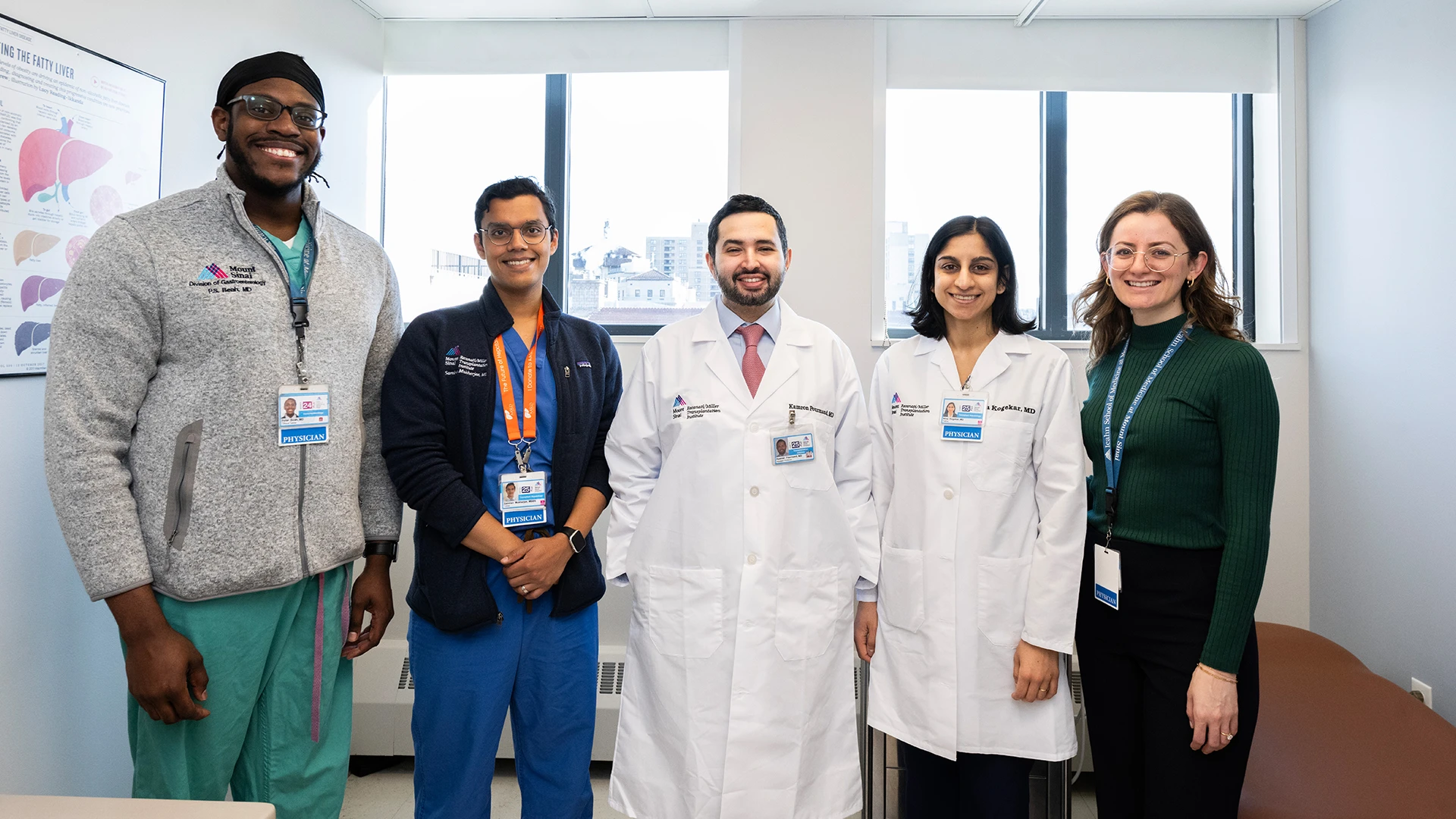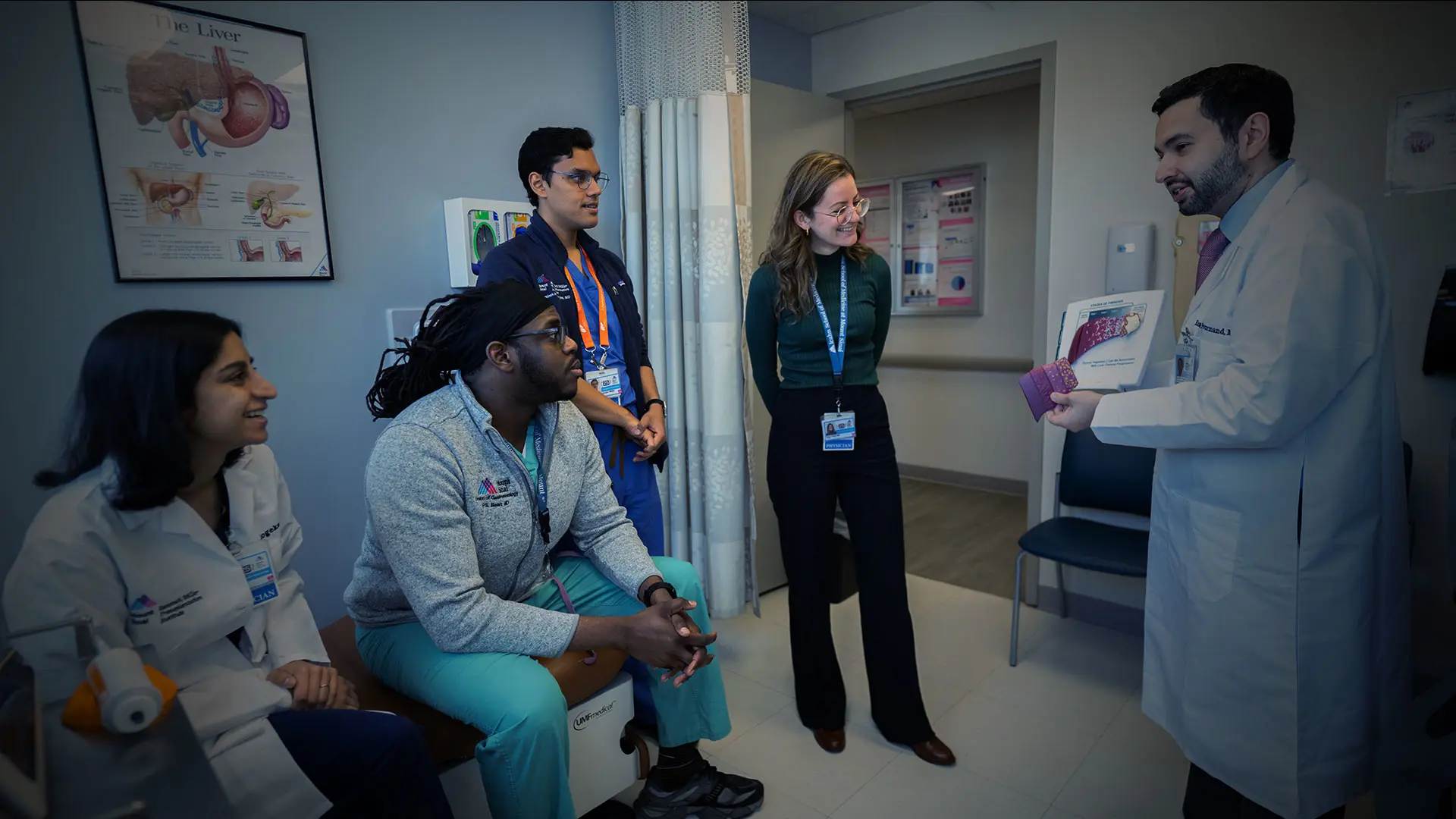If you need evidence that the training provided by The Mount Sinai Hospital’s Transplant Hepatology Fellowship is second to none, consider the fact that graduates are highly sought after by transplant programs around the world, says Kamron Pourmand, MD.
“Our fellows are consistently hired by their top choices for the next phase of their careers,” says Dr. Pourmand, Program Director at the Recanati/Miller Transplantation Institute at the Icahn School of Medicine at Mount Sinai. “In some cases, our international fellows have gone back to their home countries to evolve their liver transplantation programs. It is really rewarding to see our graduates contributing to or building upon their transplant programs based on their Mount Sinai experiences.”
The first program of its kind in the Northeast to receive Accreditation Council for Graduate Medical Education approval, the fellowship is committed to training tomorrow’s leaders in academic hepatology. Dr. Pourmand is among those leaders, giving him an important perspective on the advantages the fellowship offers each new cohort of trainees.
“I had applied to a few high-volume centers after finishing my gastroenterology fellowship here at Mount Sinai,” says Dr. Pourmand. “Of all the curricula I looked into, only Mount Sinai offered an extremely robust, hands-on clinical experience with gradually increasing autonomy alongside a diverse faculty. That approach really resonated with my learning style.”
The fundamentals that drew Dr. Pourmand to the one-year fellowship years ago as a trainee are largely unchanged. With four fellows, it is one of the largest programs of its kind nationwide, offering each trainee a community of peers who will support them throughout the fellowship. It is also conducted at the Recanati/Miller Transplantation Institute, a high-volume multi-organ transplant center that averages more than 170 liver transplants a year. That volume offers trainees exposure to a wide range of liver diseases and multidisciplinary treatment approaches, including highly complex cases that other transplant programs may not have the expertise or resources to manage.
“Not every fellow will go on to practice in a high-volume setting like this,” Dr. Pourmand says, “but this experience is invaluable because it equips our trainees to adapt or develop programs wherever they go.”

Dr. Pourmand, center, with fellows Peter Salam Beah, MD, Samiran Mukherjee, MD, Nina Kogekar, MD, and Maya Deeb, MD
Fellows have the option to do their training either immediately following their gastroenterology fellowship or concurrently during their third year of gastroenterology training within the Mount Sinai Health System. Over the course of their training, they are intimately involved in all aspects of clinical care for transplant hepatology patients. They assist attending physicians with the management of patients pre- and post-transplant, care for their own panels of patients through a weekly continuity practice, attend office hours with senior faculty, and see patients alongside surgeons in managing patients with complicated hepatobiliary disease. The goal is to build their confidence, competence, and compassion.
“It is rare in a high-volume transplant setting to offer fellows a training experience where they are helping to make decisions, propelling patient care, growing in their autonomy, and made to feel they are important to the team,” Dr. Pourmand says. “This approach ensures they graduate with a framework to approach every patient and disease they encounter. But they also know they have a lifelong network of mentors who are here to support them.”
Fellows are further supported through a dedicated job search curriculum, including training in the development of effective cover letters and curriculum vitae. Program leaders also meet with trainees to talk about their career goals and, in many cases, help open doors for career opportunities through their extensive network of contacts. “I understand how important it is to serve as an advocate for our trainees in the hiring process to make sure they feel supported in a very compressed academic year,” Dr. Pourmand says.
Having made the transition from fellow to director, Dr. Pourmand is applying his experience to ensure the fellowship continues to produce tomorrow’s leaders. He has introduced a more structured approach to trainee outpatient rotations and a new outpatient transplant apprenticeship, which offers trainees the opportunity to participate in two six-month placements with faculty members in transplantation offices.
“That has been a resounding success with fellows because they gain an understanding of the nuances of evaluating someone for transplantation and learn the fundamentals of immunosuppression management in a post-transplant outpatient setting,” Dr. Pourmand says.
Other changes are in the works, including a new two-week end-of-training rotation in which fellows will serve as acting attending physicians on the inpatient service alongside a faculty coach. Dr. Pourmand believes curricular measures such as these will ensure program graduates are ready to enter practice and remain highly sought after by transplantation programs.
“I am always striving to evolve the fellowship based on the needs of our health care systems and our patients,” Dr. Pourmand says. “My priority is making sure we deliver the most robust educational experience possible for our fellows.”
